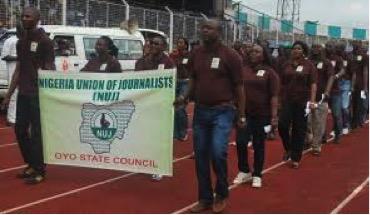PROFESSIONAL BODIES PROVIDING REFUGE AND HOPE FOR NIGERIAN JOURNALISTS
Submitted by fkakooza on

Nigeria is considered as one of the most dangerous countries in West Africa for journalists. This is because of the daunting challenges like government interference, physical and psychological harassment as well as intimidation that journalists have to navigate in their day to day life. Thanks to the existence of journalism professional bodies, that are sharing in these burdens so that good journalism can still thrive in the country.
The Nigerian Union of Journalists (NUJ) is essentially the most prominent professional body supporting journalists. Ever since NUJ was established on the 15th of March, 1955, it has led from the front in terms of advocating for the rights of the Nigerian journalists. Apart from advocating for press freedoms and the rights of journalists, NUJ also provides training and, moral and financial support for its members. These trainings have turned out to be vital for the journalists especially in times such as during elections. In the build-up to the 2023 general elections, NUJ conducted trainings for journalists to prepare them for a volatile season.
“Before the elections took place earlier this year, we partnered with INEC, Centre for Democracy and Development and other stakeholders, where we organized training programmes, capacity building programmes and workshops for the journalists across Nigeria and all these were free of charge. By the end of these activities, I am glad that over 2000 journalists were equipped to cover the elections,” says Chris Isiguzo, the President of the Union.
Mr. Isiguzo also looks back with satisfaction to the time when NUJ launched a 2019 campaign for the release of two journalists affiliated with the Daily Trust newspaper that had been arrested by the Nigerian Army. These journalists had published a story on the military’s operations against Boko Haram and this had led to their arrest and detention.
“As the Nigerian Union of Journalists, we seek to ensure that as long as journalists are within the parameters provided by the law in practicing their profession, they face no interference. So when we got news of the detention of these journalists, we launched a campaign for their release which included protests, meetings with government officials and media advocacy. I am happy that our efforts paid off and these journalists were released,” he affirms.
Just like the NUJ, the Guild of Editors is another professional body that yearns to see a Nigeria where journalists have got the freedom to practice their profession. For example, in 2020, the Guild condemned the suspension of Channels Television by the National Broadcasting Commission (NBC) for alleged unprofessional conduct. The Guild argued that the suspension was a violation of press freedom and called for its immediate reversal. In the end, the NBC lifted the suspension on a mandatory condition that the station apologized for its alleged unprofessional conduct.
"As journalists, we are obviously happy to have these professional bodies in place but there is a certain limit to which they can influence the freedom of the press. They may protest and have demonstrations but if the political leaders are not willing to back down, the professional bodies find themselves in a position that they cannot help," she laments.
Despite their tireless efforts to ensure press freedom, Mustapha Isa, the President of the Editors Guild has decried the bureaucratic tendencies exhibited by the Nigerian government that stifles the actual practice of free journalism. Some of these bottlenecks relate to the right of access to information.
“If you go to any Ministry and you are applying for information, it takes days or months for you to get that information. The best they can tell you is to go to court,” he says with regret. “But we are determined to do our jobs the way it should be done. We have always stood for truth, even at the risk of our lives,” he adds.
Apart from the bureaucracy, the professional associations also face challenges like lack of political will to protect the press, poor public perception and a fragmented media landscape amongst others.
According to the Premium Times online newspaper, in 2022 alone, over 30 cases of attacks on journalists were recorded by the Press Attack Tracker in Nigeria. This made the number of attacks only second to 2019 within a period of 4 years, when a mind boggling 74 cases were recorded.
- 382 reads
